2012届中考英语二轮复习教材突破篇Period 14 [Unit 2,Book 8B]
文档属性
| 名称 | 2012届中考英语二轮复习教材突破篇Period 14 [Unit 2,Book 8B] |
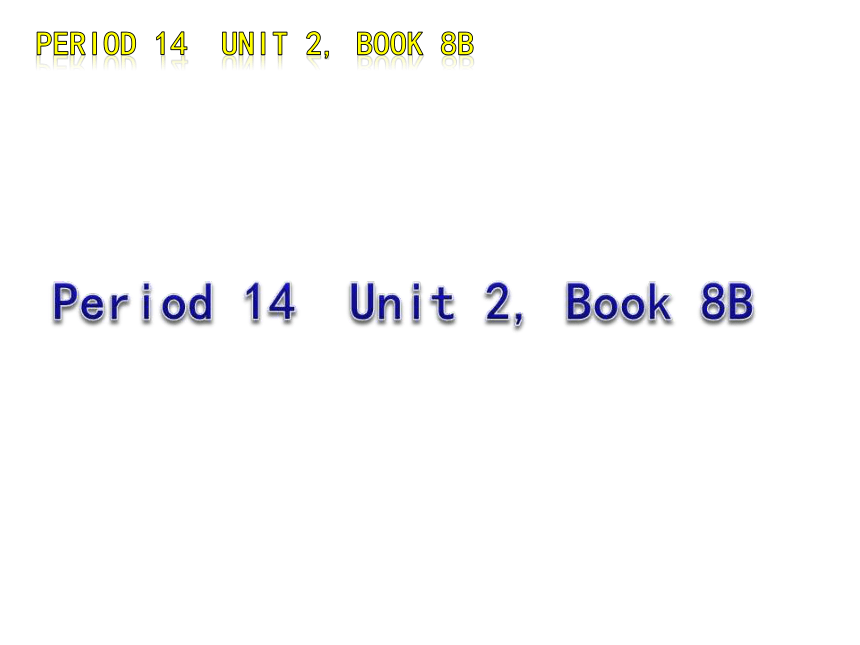
|
|
| 格式 | zip | ||
| 文件大小 | 278.6KB | ||
| 资源类型 | 教案 | ||
| 版本资源 | 通用版 | ||
| 科目 | 英语 | ||
| 更新时间 | 2012-03-04 00:00:00 | ||
图片预览

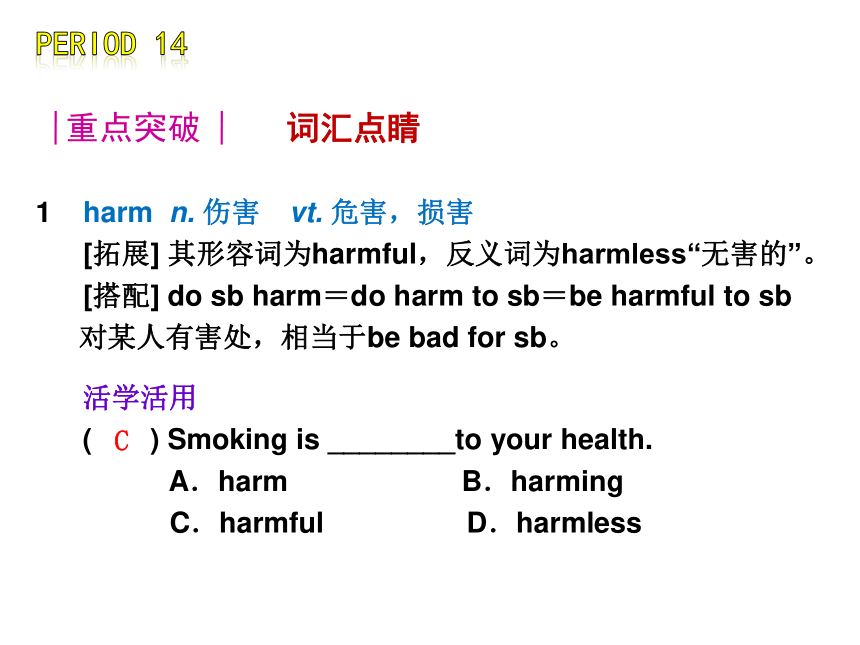
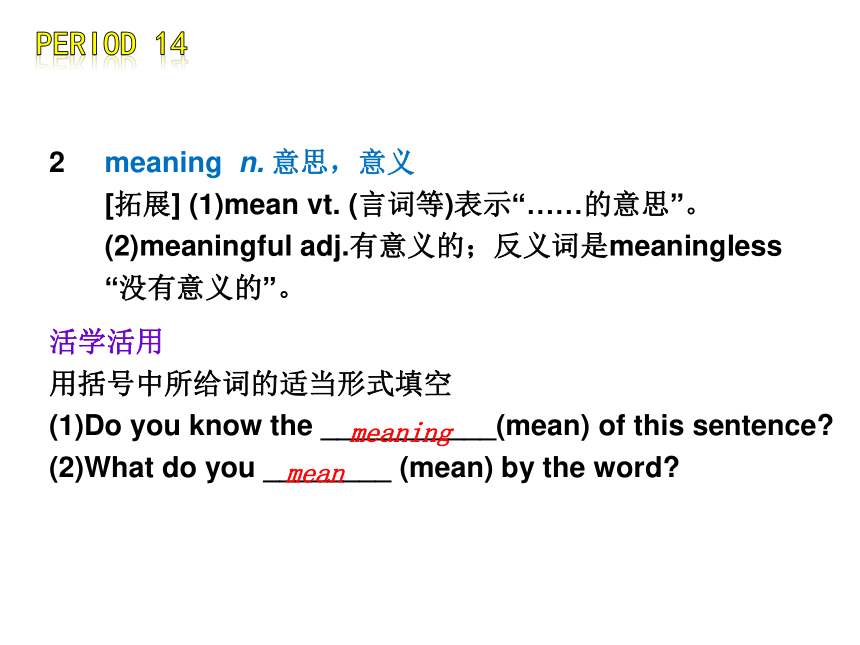
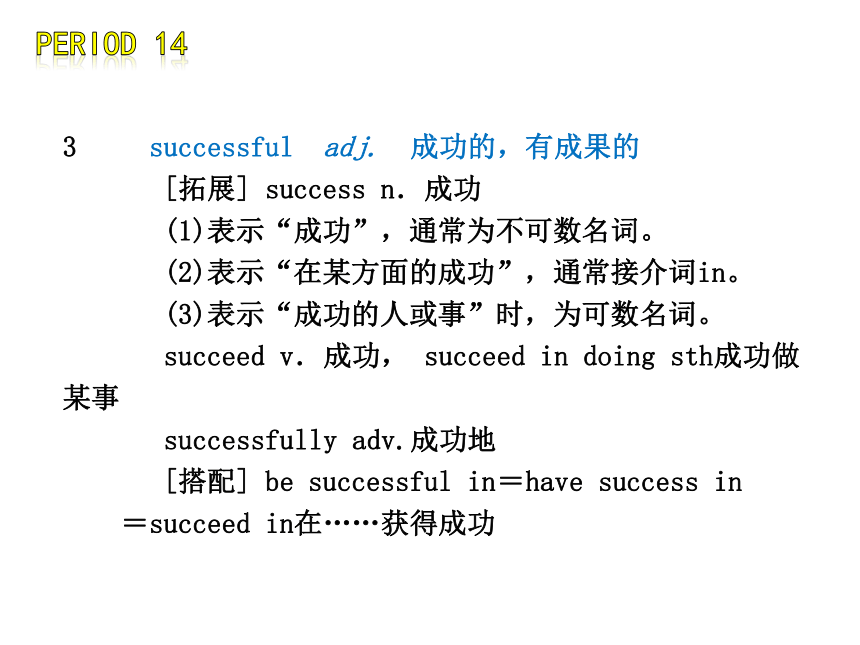
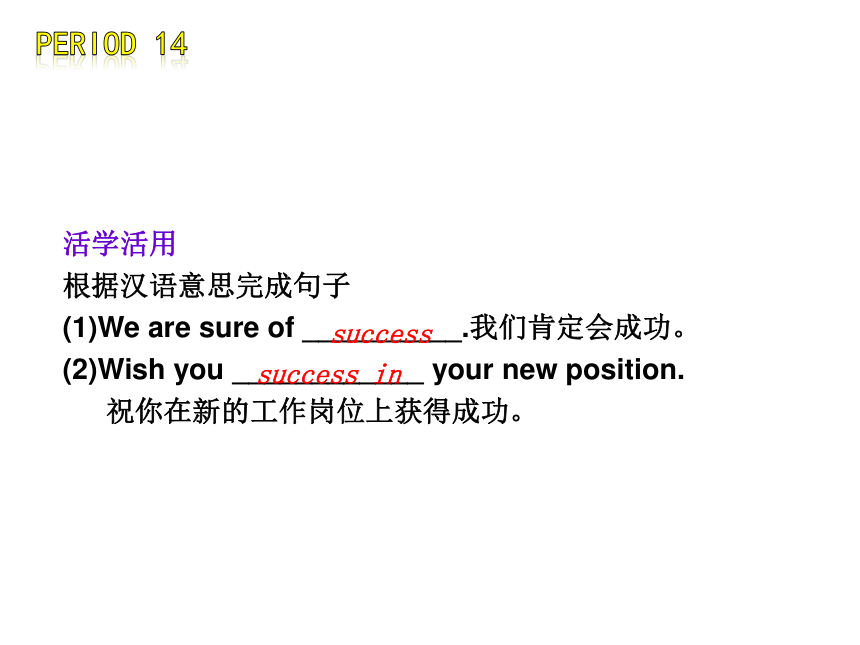
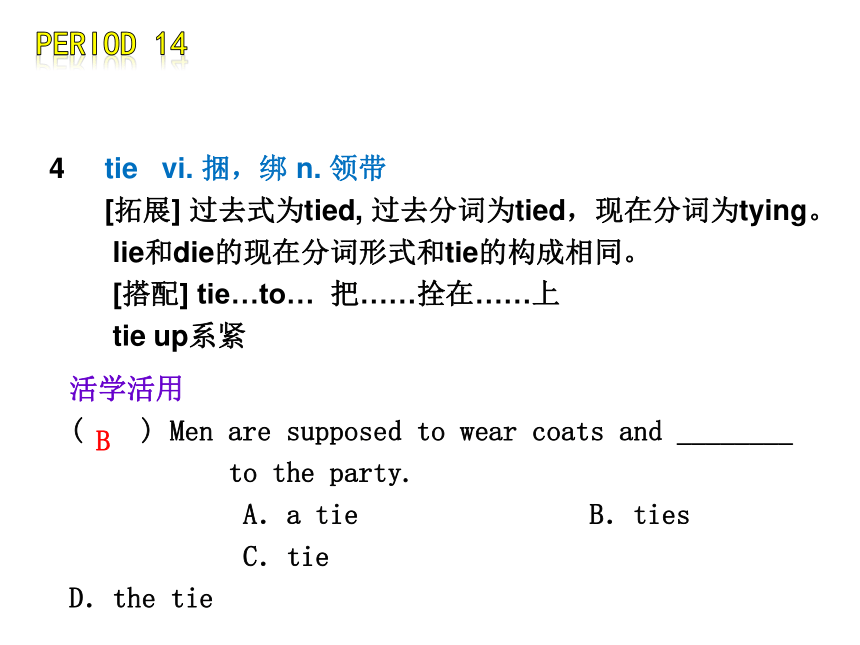
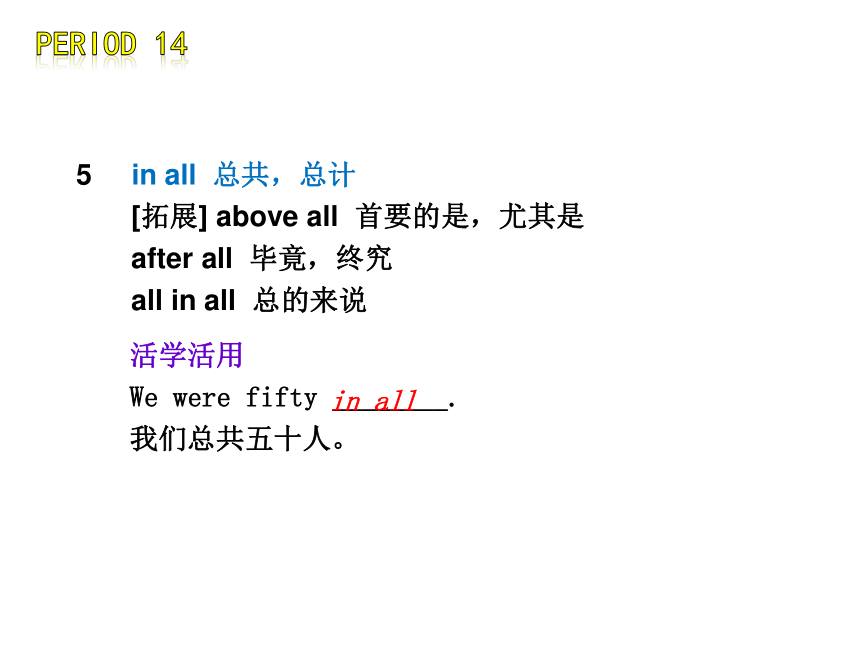
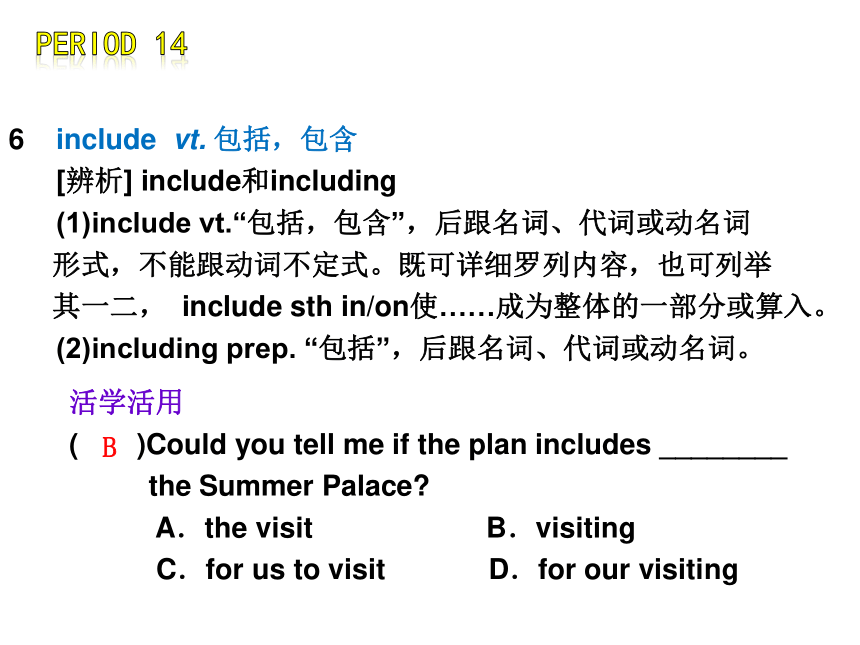
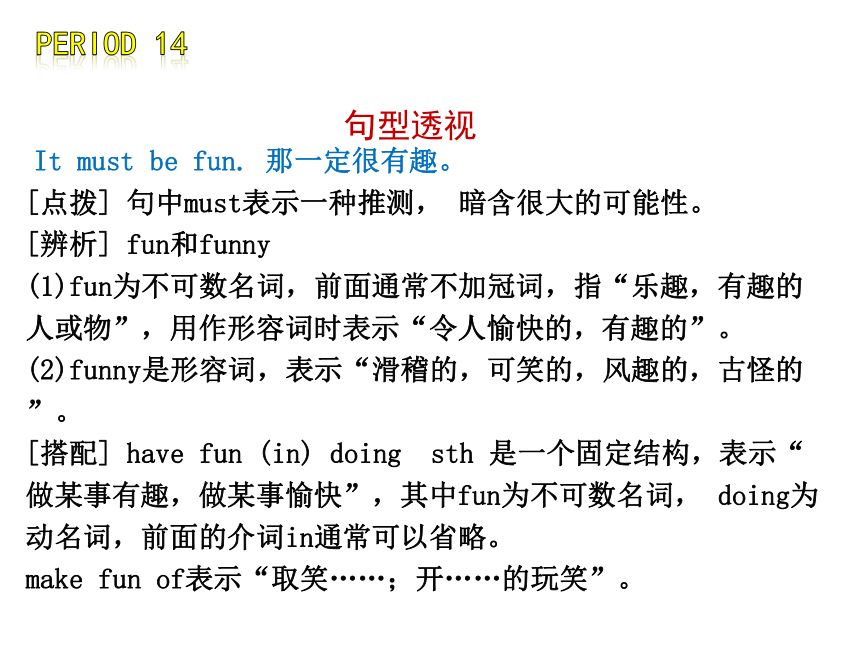
文档简介
(共22张PPT)
·译林牛津版
·译林牛津版
词汇点睛
重点突破
1 harm n. 伤害 vt. 危害,损害
[拓展] 其形容词为harmful,反义词为harmless“无害的”。
[搭配] do sb harm=do harm to sb=be harmful to sb
对某人有害处,相当于be bad for sb。
活学活用
( ) Smoking is ________to your health.
A.harm B.harming
C.harmful D.harmless
C
·译林牛津版
2 meaning n. 意思,意义
[拓展] (1)mean vt. (言词等)表示“……的意思”。
(2)meaningful adj.有意义的;反义词是meaningless
“没有意义的”。
活学活用
用括号中所给词的适当形式填空
(1)Do you know the ___________(mean) of this sentence
(2)What do you ________ (mean) by the word
meaning
mean
·译林牛津版
3 successful adj. 成功的,有成果的
[拓展] success n.成功
(1)表示“成功”,通常为不可数名词。
(2)表示“在某方面的成功”,通常接介词in。
(3)表示“成功的人或事”时,为可数名词。
succeed v.成功, succeed in doing sth成功做某事
successfully adv.成功地
[搭配] be successful in=have success in
=succeed in在……获得成功
·译林牛津版
活学活用
根据汉语意思完成句子
(1)We are sure of __________.我们肯定会成功。
(2)Wish you ____________ your new position.
祝你在新的工作岗位上获得成功。
success
success in
·译林牛津版
4 tie vi. 捆,绑 n. 领带
[拓展] 过去式为tied, 过去分词为tied,现在分词为tying。
lie和die的现在分词形式和tie的构成相同。
[搭配] tie…to… 把……拴在……上
tie up系紧
活学活用
( ) Men are supposed to wear coats and ________
to the party.
A.a tie B.ties
C.tie D.the tie
B
·译林牛津版
5 in all 总共,总计
[拓展] above all 首要的是,尤其是
after all 毕竟,终究
all in all 总的来说
活学活用
We were fifty ________.
我们总共五十人。
in all
·译林牛津版
6 include vt. 包括,包含
[辨析] include和including
(1)include vt.“包括,包含”,后跟名词、代词或动名词
形式,不能跟动词不定式。既可详细罗列内容,也可列举
其一二, include sth in/on使……成为整体的一部分或算入。
(2)including prep. “包括”,后跟名词、代词或动名词。
B
活学活用
( )Could you tell me if the plan includes ________
the Summer Palace
A.the visit B.visiting
C.for us to visit D.for our visiting
·译林牛津版
句型透视
It must be fun. 那一定很有趣。
[点拨] 句中must表示一种推测, 暗含很大的可能性。
[辨析] fun和funny
(1)fun为不可数名词,前面通常不加冠词,指“乐趣,有趣的人或物”,用作形容词时表示“令人愉快的,有趣的”。
(2)funny是形容词,表示“滑稽的,可笑的,风趣的,古怪的”。
[搭配] have fun (in) doing sth 是一个固定结构,表示“做某事有趣,做某事愉快”,其中fun为不可数名词, doing为动名词,前面的介词in通常可以省略。
make fun of表示“取笑……;开……的玩笑”。
·译林牛津版
活学活用
用括号中所给词的适当形式填空
They have fun __________(chat) with each other.
chatting
·译林牛津版
高频考点
( )1. —I _______Fujian Museum twice. How about you
—Never. I hope to visit it soon.
A.have gone to B.have been to
C.have gone D.have been
( )2. —What a nice MP4! How long______ you ______it
—Only two days.
A.have; bought B.did; buy
C.have; had D.are; having
( )3. He________ our school for two weeks.
A.left B.has left
C.has been away from D.leave
C
B
C
基础过关
·译林牛津版
词汇专练
Ⅰ. 根据句意及首字母提示完成单词
Tsim Sha Tsui is the c_______ centre of Hong Kong,
you can go there first.
2.We all like the park and it's really f________.
3.The twins are going a_______ for further study.
4.When Mr Zhao's son saw me, he w______ his hand
to me.
ultural
antastic
broad
aved
·译林牛津版
5.I'm going to fly there. Could you buy two air
t________ for me, please
6.We know the Little Mermaid is the s_______ of
Denmark.
ickets
ymbol
·译林牛津版
Ⅱ. 根据汉语提示完成句子
1.All the students _________ (鼓掌) their hands when
they saw their teacher come in.
2. It should ________ (包括) the title and the ending.
3.It was really a delightful ____________ (经历).
4.He suddenly appeared as if by ________ (魔法).
He told us something about the beautiful ________
(景象) of Japan last week.
6.You can go ________ (驾驶帆船航行) in Qingdao.
clapped
include
experience
magic
view(s)
sailing
·译林牛津版
Ⅲ. 用所给词的适当形式填空
1. ________ (final) we left without breakfast.
2.Can you tell me the ________ __ (mean) of this word
3.It's necessary _________ (work) hard at English.
4.Would you please _________ (not tell) my teacher
about it
It seemed to be ___________ (hope) to try to get
inside.
Finally
meaning
to work
not tell
hopeless
·译林牛津版
6.Many people are afraid of elephants, in fact they
are ___________ (harm).
7.The castle looked ________ (shine) and beautiful
under the fireworks.
8.That was an __________ (excite) film.
harmless
shiny
exciting
·译林牛津版
Ⅰ. 根据汉语意思完成句子
1.许多人对中国的名胜古迹很感兴趣。
Many people _______________________________
in China.
2.本和詹尼自从三年前就结婚了。
Ben and Jenny ___________________since three
years ago.
3.昨天我到家时父母正在计划去新加坡、马来西亚和泰国
旅行之事。
When I got home yesterday, my parents ______
________________ Singapore, Malaysia and Thailand.
句型专练
are interested in places of interest
have been married
were
planning a trip to
·译林牛津版
4. 她不在这儿,她去医院了。
She isn't here. She _____________ the hospital.
5.迪斯尼乐园是著名的主题乐园,包括四个不同的公园。
Disneyland is a ____________________and
____________________________.
6.他们去老师办公室的路上遇见了刘雷。
When they were _________________________________,
they met Liu Lei.
has gone to
famous theme park
includes four different parks
on their way to the teachers' office
·译林牛津版
Ⅱ. 句型转换
1.She went to Nanjing and hasn't come back yet. (改为
同义句)
She has _______ _____ Nanjing.
2.I have never seen a real dolphin before. (改为同义句)
It is my _______ _______ to see a real dolphin.
3.Lucy was washing her clothes when I came to see
her. (对画线部分提问)
______ was Lucy _______ when you came to see her
gone
to
first
time
What
doing
·译林牛津版
4. The lamb died several days ago.(改为同义句)
The lamb ______ _______ _______ _____ several days.
5. To see many elephants walking and dancing was a
funny thing. (改为同义句)
It was fun ____ ______ many elephants walking and
dancing.
has
been
dead
for
to
see
·译林牛津版
for example 与such as
这两个短语都可以作“例如”解。
for example 用来举例说明某一论点或情况,一般只举
同类人或物中的“一个”为例,作插入语,可位于句首、
句中或句末。如:
Ball games, for example, have spread around the
world.
例如,球类运动已经在世界各地传播开了。
每日一辨
·译林牛津版
(2) such as 用来列举事物时,一般列举同类人或事物中的
几个例子,插在被列举的事物与前面的名词之间,as 后
面不可有逗号。如:
Some of the rubbish, such as food, paper and iron,
rots away over a long period of time.
有些废物,如剩饭、废纸和废铁,时间一久就烂掉了。
·译林牛津版
·译林牛津版
词汇点睛
重点突破
1 harm n. 伤害 vt. 危害,损害
[拓展] 其形容词为harmful,反义词为harmless“无害的”。
[搭配] do sb harm=do harm to sb=be harmful to sb
对某人有害处,相当于be bad for sb。
活学活用
( ) Smoking is ________to your health.
A.harm B.harming
C.harmful D.harmless
C
·译林牛津版
2 meaning n. 意思,意义
[拓展] (1)mean vt. (言词等)表示“……的意思”。
(2)meaningful adj.有意义的;反义词是meaningless
“没有意义的”。
活学活用
用括号中所给词的适当形式填空
(1)Do you know the ___________(mean) of this sentence
(2)What do you ________ (mean) by the word
meaning
mean
·译林牛津版
3 successful adj. 成功的,有成果的
[拓展] success n.成功
(1)表示“成功”,通常为不可数名词。
(2)表示“在某方面的成功”,通常接介词in。
(3)表示“成功的人或事”时,为可数名词。
succeed v.成功, succeed in doing sth成功做某事
successfully adv.成功地
[搭配] be successful in=have success in
=succeed in在……获得成功
·译林牛津版
活学活用
根据汉语意思完成句子
(1)We are sure of __________.我们肯定会成功。
(2)Wish you ____________ your new position.
祝你在新的工作岗位上获得成功。
success
success in
·译林牛津版
4 tie vi. 捆,绑 n. 领带
[拓展] 过去式为tied, 过去分词为tied,现在分词为tying。
lie和die的现在分词形式和tie的构成相同。
[搭配] tie…to… 把……拴在……上
tie up系紧
活学活用
( ) Men are supposed to wear coats and ________
to the party.
A.a tie B.ties
C.tie D.the tie
B
·译林牛津版
5 in all 总共,总计
[拓展] above all 首要的是,尤其是
after all 毕竟,终究
all in all 总的来说
活学活用
We were fifty ________.
我们总共五十人。
in all
·译林牛津版
6 include vt. 包括,包含
[辨析] include和including
(1)include vt.“包括,包含”,后跟名词、代词或动名词
形式,不能跟动词不定式。既可详细罗列内容,也可列举
其一二, include sth in/on使……成为整体的一部分或算入。
(2)including prep. “包括”,后跟名词、代词或动名词。
B
活学活用
( )Could you tell me if the plan includes ________
the Summer Palace
A.the visit B.visiting
C.for us to visit D.for our visiting
·译林牛津版
句型透视
It must be fun. 那一定很有趣。
[点拨] 句中must表示一种推测, 暗含很大的可能性。
[辨析] fun和funny
(1)fun为不可数名词,前面通常不加冠词,指“乐趣,有趣的人或物”,用作形容词时表示“令人愉快的,有趣的”。
(2)funny是形容词,表示“滑稽的,可笑的,风趣的,古怪的”。
[搭配] have fun (in) doing sth 是一个固定结构,表示“做某事有趣,做某事愉快”,其中fun为不可数名词, doing为动名词,前面的介词in通常可以省略。
make fun of表示“取笑……;开……的玩笑”。
·译林牛津版
活学活用
用括号中所给词的适当形式填空
They have fun __________(chat) with each other.
chatting
·译林牛津版
高频考点
( )1. —I _______Fujian Museum twice. How about you
—Never. I hope to visit it soon.
A.have gone to B.have been to
C.have gone D.have been
( )2. —What a nice MP4! How long______ you ______it
—Only two days.
A.have; bought B.did; buy
C.have; had D.are; having
( )3. He________ our school for two weeks.
A.left B.has left
C.has been away from D.leave
C
B
C
基础过关
·译林牛津版
词汇专练
Ⅰ. 根据句意及首字母提示完成单词
Tsim Sha Tsui is the c_______ centre of Hong Kong,
you can go there first.
2.We all like the park and it's really f________.
3.The twins are going a_______ for further study.
4.When Mr Zhao's son saw me, he w______ his hand
to me.
ultural
antastic
broad
aved
·译林牛津版
5.I'm going to fly there. Could you buy two air
t________ for me, please
6.We know the Little Mermaid is the s_______ of
Denmark.
ickets
ymbol
·译林牛津版
Ⅱ. 根据汉语提示完成句子
1.All the students _________ (鼓掌) their hands when
they saw their teacher come in.
2. It should ________ (包括) the title and the ending.
3.It was really a delightful ____________ (经历).
4.He suddenly appeared as if by ________ (魔法).
He told us something about the beautiful ________
(景象) of Japan last week.
6.You can go ________ (驾驶帆船航行) in Qingdao.
clapped
include
experience
magic
view(s)
sailing
·译林牛津版
Ⅲ. 用所给词的适当形式填空
1. ________ (final) we left without breakfast.
2.Can you tell me the ________ __ (mean) of this word
3.It's necessary _________ (work) hard at English.
4.Would you please _________ (not tell) my teacher
about it
It seemed to be ___________ (hope) to try to get
inside.
Finally
meaning
to work
not tell
hopeless
·译林牛津版
6.Many people are afraid of elephants, in fact they
are ___________ (harm).
7.The castle looked ________ (shine) and beautiful
under the fireworks.
8.That was an __________ (excite) film.
harmless
shiny
exciting
·译林牛津版
Ⅰ. 根据汉语意思完成句子
1.许多人对中国的名胜古迹很感兴趣。
Many people _______________________________
in China.
2.本和詹尼自从三年前就结婚了。
Ben and Jenny ___________________since three
years ago.
3.昨天我到家时父母正在计划去新加坡、马来西亚和泰国
旅行之事。
When I got home yesterday, my parents ______
________________ Singapore, Malaysia and Thailand.
句型专练
are interested in places of interest
have been married
were
planning a trip to
·译林牛津版
4. 她不在这儿,她去医院了。
She isn't here. She _____________ the hospital.
5.迪斯尼乐园是著名的主题乐园,包括四个不同的公园。
Disneyland is a ____________________and
____________________________.
6.他们去老师办公室的路上遇见了刘雷。
When they were _________________________________,
they met Liu Lei.
has gone to
famous theme park
includes four different parks
on their way to the teachers' office
·译林牛津版
Ⅱ. 句型转换
1.She went to Nanjing and hasn't come back yet. (改为
同义句)
She has _______ _____ Nanjing.
2.I have never seen a real dolphin before. (改为同义句)
It is my _______ _______ to see a real dolphin.
3.Lucy was washing her clothes when I came to see
her. (对画线部分提问)
______ was Lucy _______ when you came to see her
gone
to
first
time
What
doing
·译林牛津版
4. The lamb died several days ago.(改为同义句)
The lamb ______ _______ _______ _____ several days.
5. To see many elephants walking and dancing was a
funny thing. (改为同义句)
It was fun ____ ______ many elephants walking and
dancing.
has
been
dead
for
to
see
·译林牛津版
for example 与such as
这两个短语都可以作“例如”解。
for example 用来举例说明某一论点或情况,一般只举
同类人或物中的“一个”为例,作插入语,可位于句首、
句中或句末。如:
Ball games, for example, have spread around the
world.
例如,球类运动已经在世界各地传播开了。
每日一辨
·译林牛津版
(2) such as 用来列举事物时,一般列举同类人或事物中的
几个例子,插在被列举的事物与前面的名词之间,as 后
面不可有逗号。如:
Some of the rubbish, such as food, paper and iron,
rots away over a long period of time.
有些废物,如剩饭、废纸和废铁,时间一久就烂掉了。
